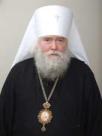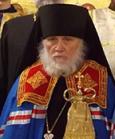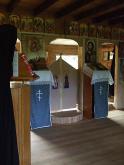Sunday, March 1, 2015
Second week of the Great Fast
We have reached the beginning of the second week of Great Lent. The Church urges the faithful on in the spiritual race:
Let us set out with joy upon the second week of the Fast; and like Elijah the Tishbite let us fashion for ourselves from day to day, O brethren, a fiery chariot from the four great virtues; let us exalt our minds through freedom from the passions; let us arm our flesh with purity and our hands with acts of compassion; let us make our feet beautiful with the preaching of the Gospel; and let us put the enemy to fight and gain the victory.
Stikhira at Vespers on the Sunday of Orthodoxy
From all the divine service texts of Great Lent, it is clear that keeping the fast is not as simple as abstention from certain foods. It is an attitude of reverence, fear of God, prayer and repentance. None of these would themselves be possible without the help of God:
As we set out upon the second week of the Fast, direct our steps, O Lord: Shine upon us with the sanctifying light of Thy commandments, and make us worthy to offer on bended knees a prayer acceptable to Thee: For Thou art our Father and we are Thy sons. With feast we sing Thy praise and call upon Thy name.
Sedalen at Matins on Monday of the second week of Lent
Christians must be active with the other virtues in order for Lent to be profitable. For example, almsgiving is most appropriate at this time:
Fast, then, by lifting up acts of almsgiving before [God’s] eyes, by doing what you do with love for your neighbour, by being holy. What you take from yourself, give to someone else so that your needy neighbour’s body may be restored by the affliction of your own. The Lord says through the prophet: “What you fasted and mourned, did you fast for Me? And when you eat and drink, do you not eat and drink for yourselves?” He eats and drinks for himself who nourishes his body with the Creator’s common gifts, without regard for the needy; and he fasts for himself if he does not bestow upon the poor what he takes for a time from his own use, but keeps it instead to fill his own stomach later.
St Gregory the Great(6th century)
God sees all our feeble struggles in the present fast, and every good deed we manage to complete with His help and blessing.
Be of good cheer, but work, strive earnestly; for nothing shall be lost. Every prayer, every psalm you sing, every good deed, every marriage duly observed, continence kept for God’s sake is recorded…for you shall rise [from the dead] clothed with your own sins, or else with your righteous deeds.
St Kyril of Jerusalem (4th century)
Sunday, February 22, 2015
Beginning of the Great Fast
Fasting was ordained in Paradise. The first injuction was delivered to Adam that he was not to eat of the tree of the knowledge of good and evil. “Thou shalt not eat” is a law of fasting and abstinence. The general argument is rather against excess than in support of ceremonial abstinence. In Paradise there was no wine, no butchery of beasts, no eating of flesh. Wine came in after the flood. Noah became drunk because wine was new to him. So fasting is older than drunkenness….Fasting begets prophets, strengthens strong men. Fasting makes lawgivers wise, is the soul’s safeguard, the body’s trusty comrade, the armor of the champion, the training of the athlete. The conclusion, however, is a warning against mere carnal abstinence. Beware of limiting the good of fasting to mere abstinence from meats. Real fasting is alienation from evil. Loose the bands of wickedness. Forgive your neighbour the mischief he has done you. Forgive him his trespasses against you. Do not fast for strife and debate. You do not devour flesh, but you devour your brother. You abstain from wine, but you indulge in outrages. You wait for the evening before you take food, but you spend the day in the law courts. Woe to those who are drunken, but not with wine! Anger is the intoxication of the soul, and it out of its wits like wine….May the Lord, Who has brought us to this period of time, grant to us, as to gladiators and wrestlers, that we may show firmness and constancy in the beginning of contests!
St Basil the Great, 4th centuryThere is a drunkenness not of wine but of hatred. THis more than anything else causes God to turn away. As for the devil, he attempts to bring it about in those who pray and fast. He prompts them to remember wrongs, he directs their thoughts toward harboring malice, and he sharpens their tongues for slander. So brethren, in this time of fasting and prayer, let us with all our hearts forgive anything real or imaginary we have against anyone. May we devote ourselves to love! Let us consider one another as an incentive to love and good works, speaking in defense of one another, having good thoughts and dispositions within us before God and men. In this way our fasting will be laudable and blameless, and our requests to God will be readily received.
St Gregory Palamas, 14th centuryWe are told: It is of no great consequence to eat non-fasting food during the Great Fast. It is of no consequence if you wear expensive and beautiful outfits, or go to the theater, or attend parties and masquerade balls. It is of no import if you use expensive chine and furniture. It is of no matter if you acquire expensive carriages and dashing steeds, amass and hoard things, etc. Yet what is it that turns our heart away from God, away from the Fountain of Life? Because of what do we lose eternal life? Is it not because of gluttony, of expensive clothing like that of the rich man of the Gospel story, is it not because of theater and balls? What turns us hard-hearted toward the poor and even toward our relatives? Is it not our passion for sweets, for satisfying the belly in general, for clothing, for expensive dishes, furniture, carriages, for money and other things? Is it possible to serve Christ and Belial? That is impossible. Why did Adam and Eve lose Paradise? Why did they fall into sin and death? Was it not because of one evil? Let us attentively consider why we do not care about the salvation of our soul, which cost the Son of God so dearly. Why do we compound sin upon sin? Why do we fall endlessly into opposing God and choosing a life of vanity? It is not because of a passion for earthly things and especially for earthly pleasures? What makes our hearts become crude? Why do we become flesh and not spirit, perverting our moral nature? Is it not because of a passion for food , drink, and other earthly comforts? How after this can one say that it does not matter whether you eat non-fasting food during the fast? The fact that we talk this way is in fact a show of pride, and idle thought, and act of disobedience, a refusal to submit to God, and a separation from Him.
St John of Kronstadt, 20th century
Tuesday, February 17, 2015
Cheese fare week
This week, the Holy Church calls Her children to prepare for the fast by abstaining from meat. Even though we are still celebrating the feast of the Meeting of the Lord, the divine services begin to have a solemn character, calling us all to repentance and cleansing of our souls.
Grant us humbly and in peace to pass through the days of cleansing that prepare us for the Fast. In Thine ineffable love for mankind, o Christ our God, destroy the wicked schemes of the enemy and preserve us all by Thy Cross, for Thou alone knowest the secrets of man’s heart.
Sedalen, Matins on Wednesday of Cheese week
On Wednesday and Friday this week, we make prostrations with the prayer of St Ephraim the Syrian, emphasising that our souls should already be fasting from sin. Although many people tend to over-indulge in cheese and eggs this week, this is not at all what the Church intended for us:
The grace of the holy Fast has begun to shine upon us, cleansing our unstable thoughts and driving away the darkness of our surfeiting. Let us, then, accept this grace with eager faith.
Ode 9 of the Canon, Matins on Wednesday of Cheese week
It is important to remember that the bodily virtue of fasting, although indispensable, is only a tool by which the Christian hopes to gain spiritual virtues:
If thou dost fast from food, my soul, yet dost not cleanse thyself from passions, thou dost rejoice in vain over thine abstinence. For if thy purpose is not turned toward amendment of life, as a liar thou are hateful in God’s sight, and thou dost resemble the evil demons who never eat at all. Do not by sinning make the fast worthless, but firmly resist all wicked impulses. Picture to thyself that thou are standing beside the crucified Saviour, or rather, that thou art thyself crucified with Him who was crucified for thee; and cry out to Him: Remember me, o Lord, when Thou comest in Thy Kingdom.
Stihira, Matins on Wednesday of Cheese week
Read also the February “Shepherd” magazine from the Brotherhood of Saint Edward in the United Kingdom, which contains more materials on the approaching Great Lent.
Monday, February 9, 2015
Remember the second coming, and be sobered
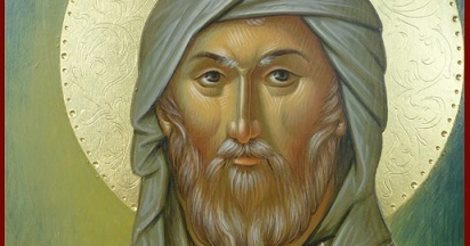
Lift your eyes to Heaven, when it, like a clean mirror, gloriously illumines the earth with its stars, and say in awe: If the stars shine with such glory, then how much more so will the righteous and the saints who have done the holy will of God shine with the inexpressible light of saving glory when the Lord comes.
Having called to remembrance that awesome coming, shudder in body and soul, and with heartfelt agony say to yourself: What sort of person will I, a sinner, show myself to be in that terrible hour? How will I stand before the throne of the awesome Judge? How could I, who am dissolute have a place among those who are perfect? Or how could I, who am a goat, stand among the sheep at Christ’s right hand? Or how could I, who am fruitless, be numbered among the saints, who have here brought forth the fruits of truth?
The martyrs will their torments, the ascetics their good works; but what will I have to show but my apathy and my incessant indulgence?
O sinful soul, shameless soul, o soul which has always hated the God-pleasing way of life! How long will you delight in your wretched addiction to evil thoughts? What do you wait for in your apathy?
Do you think that the Judge will be late in coming? He will not tarry; rather, His coming will be like terrible lightning from the heavens.
Try to be prepared for that terrible hour, that you might not then weep unto the ages.
St Ephraim the Syrian, 4th century
Monday, February 2, 2015
St Maximus the Confessor: Four Hundred Centuries on Love
The one who does not disdain glory and pleasure and greed which increases them and which is in turn produced by them cannot cut away the occasions of anger. And the one who does not cut them away cannot attain perfect love.
1:75Humility and distress free man from every sin, the former by cutting out the passions of the soul, the latter those of the body. The blessed David shows that he did this in one of his prayers to God, “Look upon my humility and my trouble, and forgive all my sins.” (Psalm 24:18)
1:76Silence the one who is slandering in your hearing lest you commit a double sin with him: by accustoming yourself to this deadly vice and by not restraining him from foolish talk against his neighbour.
1:60Do not lend your ear to the slanderous tongue nor your tongue to the fault-finders ear by readily speaking or listening to anything against your neighbour. Otherwise you will fall away from divine love and be found excluded from eternal life.
1:58St Maximus the Confessor, 7th century
Sunday, February 1, 2015
Metroplitan Anthony: Sermon on the day of the Publican and Pharisee (1934)
God, I thank Thee, that I am not as other men are, extortioners, unjust, adulterers, or even as this publican.
Luke 18:11
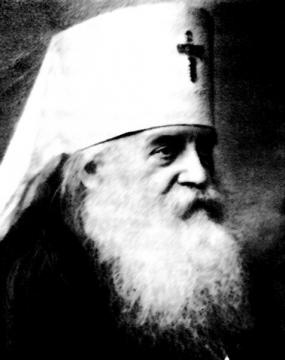 To understand the meaning of this parable, we must first eliminate the erroneous interpretation of it. This erroneous interpretation dominates in our secular society, which is not averse to mentioning it in idle talk about the Pharisee in question; but in a totally wrong view of his personality. For our contemporaries, the very word “Pharisee”, before they are conscious or it, conjures an understanding of Pharisees in general as conscious hypocrites…. evil, envious, and dissolute.
To understand the meaning of this parable, we must first eliminate the erroneous interpretation of it. This erroneous interpretation dominates in our secular society, which is not averse to mentioning it in idle talk about the Pharisee in question; but in a totally wrong view of his personality. For our contemporaries, the very word “Pharisee”, before they are conscious or it, conjures an understanding of Pharisees in general as conscious hypocrites…. evil, envious, and dissolute.
Of course, this description is quite applicable to many Pharisees, perhaps the majority, but this is not what our Saviour described in His parable.
First of all, note that the aforementioned Pharisee did not ascribe righteousness to himself. Rather, he thanked God for it, the giver of spiritual wealth. Modern hypocrites and critics of phariseeism express themselves differently: “I am an honorable man, and certainly honest, and therefore I do not allow anyone to step on my toes”. This kind of admission sets the modern “gentleman” a lot lower than the Pharisee. The latter listed his virtues in the face of the all-seeing God, and, of course, could not lie. Consequently, his error was not in inaccuracy or falsity of confession, but rather, in his relation to his own conscience.
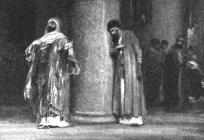 In order to clarify where the mistake or sin lies, we ask our listeners to compare our earthly life with the path of a traveler, who was ordered to go somewhere he did not know. That traveler will be in the right who does not look back at the way, but rather, looks forward, thinking how much he has left to go, asking the help of God and remembering the words of Christ: “No man, having put his hand to the plough, and looking back, is fit for the kingdom of God. ” (Luke 9.62)
In order to clarify where the mistake or sin lies, we ask our listeners to compare our earthly life with the path of a traveler, who was ordered to go somewhere he did not know. That traveler will be in the right who does not look back at the way, but rather, looks forward, thinking how much he has left to go, asking the help of God and remembering the words of Christ: “No man, having put his hand to the plough, and looking back, is fit for the kingdom of God. ” (Luke 9.62)
At the same time, a good Christian should not leave off self-reproach. He should certainly not boast of the successes made in the spiritual life. Of course, this does not mean he should not pray with thanks to the Lord, for what sins or vices the Lord has already delivered him from. However, he should not forget that God would have sent him more abundant gifts of grace, if he only humbled himself, and prayed earnestly, repenting of the sins he happened to commit, forcing himself to new feats of combat against them.
That is what was absent in the aforementioned Pharisee. Therefore, the publican, who bitterly mourned over his sins went to his house more justified than the Pharisee, who was satisfied with his external virtues. Note that expression - more justified.
Hence, the Pharisee was not just boasting before God. He actually tried to please Him and to preserve his conscience pure.
From this it is clear that our whole life should be a constant forward movement, constantly coming closer to God, by the exercise virtue and dissatisfaction with ourselves.
This is what almost none of our secular theologians understand, and even a significant part of the spiritual ones.
Struggle against oneself, self-constraint and self-reproach – that is our way to the heavenly kingdom. If these inner struggles are present, then our whole life will gradually move towards perfection. May the Lord strengthen us in constant remembrance of the proverb we heard today.
Sermon pronounced by Metropolitan Anthony (Khrapovitsky) in 1934 in Sremsky Karlovcy.
Friday, December 19, 2014
From the November and December “Shepherd”
A practical tip on fasting:
There are some very down-to-earth practical things that one can do: make sure that you keep your diaries as free as possible from social engagements; as in all the fasts avoid making plans for journeys away from home; simply clear your freezers and fridges of non-lenten foods. Then plan to set aside more time for church attendance, for prayer at home and spiritual reading. Obtain books to read during this period which will instruct you about our Faith and the Christian life. Make a conscious and generous assessment of what you intend to give away in alms during the fast, and stick to it. Perhaps volunteer to help in charitable work over the “Western Christmas” freeing someone else up to celebrate their feast. And perhaps what we so often fail to do: resolve from the very start to keep this fast to the very best of your ability and never give up trying to do so. Remember the fast is not something inflicted upon us as a rule. It is a weapon given us to aid us in our spiritual battle. A soldier who holds a sword in his hand during battle and does not use it is not likely to come through that battle a well man.
Fathers of St Edward Brotherhood
Just as in the case of a sweet dish on the table or a gold piece thrown down on the crossroads, whoever comes first [to church] is the most satisfied or enriched. Godly words in the divine church are sweeter than honey and honeycomb and dearer than a thousand gold pieces, according to the holy David (Ps. 18:10). He who arrives first will enjoy grace first, but he who arrives lazily and carelessly is a stranger to grace.
Ven. Joseph of Volokolamsk, + 1515 A.D.
Let us marvel, O Christians, at the voluntary self-abasement for us of our great God and Saviour; but this is still too little. Let us stand in growing reverence before this self-abasement of His, but even this is not sufficient. Let this mind be in you, the Apostle teaches us, which was in Christ Jesus (Phil. 2:5). You also come to have the same feelings as Jesus Christ had; be disposed just as He was disposed. What does this mean? The Apostle himself explains this, stating just before the cited quotation: Let nothing be done through strife or vainglory; but in lowliness of mind let each esteem the other better than himself (Phil. 2:3). From this it can be seen that he teaches us the example of Jesus Christ, not to place ourselves on high and not to exalt ourselves with any prerogatives, but to humble ourselves, both within ourselves and
before others.
St Philaret, Metropolitan of Moscow, + 1867 A.D.
Read the November edition and the December edition of the Shepherd, published by St Edward Orthodox Brotherhood,, a men’s monastery in England, which is under the omophorion of our Greek Sister Church.
Saturday, December 13, 2014
Bishop Nikon on current issues in the Russian Orthodox Church Abroad
Bishop Nikon speaks abnout a spiritual approach to certain politically-influenced current problems among some people of the Russian Orthodox Church Abroad. He speaks about spiritual life, which relates intimately to all problems in life.
A characteristic of spiritual life of beginners is their great zeal. Often, this zeal is unfortunately a “zeal without knowledge”, which has the capacity to be used by the demons to the destruction of a Christian. Although a beginner’s zeal may not be directly sinful or passionate, it is not yet holy zeal, full of love for God and neighbour. Indeed, it cannot yet be holy, because the spiritual life cannot be learned from books - it must be lived through, over many years.
To assist in learning the Christian life, correct spiritual practice and guidance are of great importance. Every believer’s prayer and life must follow the teachings of Scripture and the Holy Fathers. This might seem not too difficult, as many written sources are widely available today, and anyone can read them….However, without a living spiritual guide, a beginner is bound to fall many times, and may not be able to extricate himself from his inevitable mistakes. Both laymen and clergy must therefore have their own spiritual father here on earth, to whom they not only confess their sins regularly, but also disclose their inner thoughts and feelings, as well as their manner of practicing the faith. This they do in order to learn the true Way, and in order to never be separated from Christ on account of some mistake, some slip in their mind, feeling, or understanding.
We are all beginners in spiritual life, and it is not possible for us to discern whether we are on the correct path without guidance.
This way of spiritual life is not only for monks, but rather, it is for every Christian!
Monday, November 10, 2014
The Fathers on TRIALS and TEMPTATIONS
Destroy temptations and thoughts - and there will not be a single saint. The one who runs away from temptations runs from eternal life. This is why one of the Saints says: “Who gave the Holy Martyrs their crowns, if not their tormentors? Who gave St Stephen such glory, if not those who stoned him? He adds a saying from another Saint, who said: “I do not blame those who persecute me, instead, I call them my benefactors; and I do not reject the Doctor of souls, who gives my vain soul the medicine of dishonour, because I am afraid that He should say even to my soul: “We would have healed Babylon, but she is not healed” (Jeremiah 51:9); and again: “how often would I have gathered thy children together, as a hen doth gather her brood under her wings, and ye would not! Behold, your house is left unto you desolate” (Luke 13:34-35)
Venerable Zosima, who revealed the glory of St Mary of Egypt, 5th century
Suffering deliberately embraced cannot free the soul totally from sin unless the soul is also tried in the fire of suffering that comes unchosen. For the soul is like a sword: If it does not go “through fire and water” (Psalm 66:12 (LXX)) - that is, through suffering deliberately embraced and suffering that comes unchosen, - it cannot but be shattered by the blows of fortune.
Ilias the Presbyter, ?7th century
Just as sick people need surgery and cautery to recover the health they have lost, so we need trials, and toils of repentance, and fear of death and punishment, so that we may regain our former health of soul and shake off the sickness which our folly has induced. The more suffering, the more we should thank Him for His compassion and accept the suffering joyfully. For it is to help us that He increases our tribulation, both through the sufferings we willingly embrace in our repentance and through the trials and punishments not subject to our will. In this way, if we voluntarily accept affliction, we will be freed from our sickness and from the punishments to come, and perhaps even from present punishments as well. Even if we are not grateful, our Physician in His grace will still heal us, although by means of chastisement and manifold trials. But if we cling to our disease and persist in it, we will deservedly bring upon ourselves agelong punishment. We will have made ourselves like the demons and so will justly share with them the agelong punishments prepared for them; for, like them, we will have scorned our Benefactor.
St Peter of Damaskos, 11th century
Saturday, November 8, 2014
St Demetrius the Great-Martyr and Christian attitude to sensual pleasures
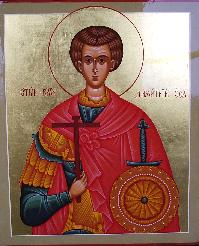 St Dimitri was a high-ranking official in Thessalonica. He not only cared for the people’s material well-being, but also taught them the Christian faith. This is why Emperor Maximian imprisoned him.
St Dimitri was a high-ranking official in Thessalonica. He not only cared for the people’s material well-being, but also taught them the Christian faith. This is why Emperor Maximian imprisoned him.
Emperor Maximian loved bodily and vain pleasures. He organised spectacles where Lyaeus, a giant, from a platform would throw innocent victims onto tightly-spaced, upright spears, so that they would be stabbed to death. However, a Christian youth, Nestor, was found who would deprive the Emperor of his favourite entertainment. It was Dimitri who blessed and encouraged this struggle, which culminated in Lyaeus the giant being killed by a weak teenager.
In the context of St Dimitri and St Nestor’s struggles, it is appropriate to ask ourselves: What is the Christian attitude to sensual pleasures?
a. The purpose of pleasures and entertainments is to give us an essential rest from work. Ever since the expulsion of man from paradise, hard work has been necessary.
..cursed is the ground for thy sake; in sorrow shalt thou eat of it all the days of thy life. Thorns also and thistles shall it bring forth to thee.
Genesis 3:17-18
Our work is usually associated with sweat and sorrows. The body requires rest to renew its strength, through food and sleep. The soul seeks to forget its sorrows and renew its powers in activities of a higher nature, such as art, which remind it of the perfection of Paradise. This is natural, or even essential, and therefore not to be condemned.
b. But before we give ourselves over to pleasures, we must ask ourselves, is our body and soul really exhausted from hard, but useful, important and unavoidable work? Should we allow it a deserved reward? Or is our life filled with boredom and heaviness of soul, the fruit of idleness rather than hard work? The Apostle says
…if any would not work, neither should he eat.
1 Thessalonians 3:10
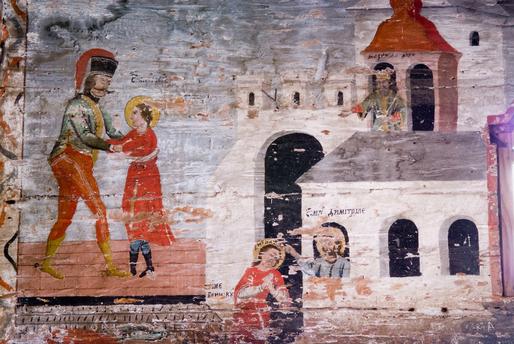
St Nestor defeats the giant Lyaeus. Bottom right: St Demetrius blessing St Nestor
c. Does the pleasure we propose strengthen us, and not, on the contrary, further exhaust our bodily powers? Will it lift up your soul, or will it weaken the mind? Will it enliven your heart with pure, deep and life-giving joy, making the soul ready and cheerful for work; good-tempered and patient in sorrows? If not, then it is better for the soul to deny itself such pleasure. The Apostle says:
All things are lawful for me, but all things are not expedient: all things are lawful for me, but all things edify not.
1 Corinthians 10:23
d. Will this pleasure distract us from some other, more important tasks? For example, our civil or spiritual duties? If it does, our pleasure is not only harmful, but directly criminal! If, when the Church calls him to glorification of God’s love and mercy, when She celebrates the greatest mysteries of our salvation, an Orthodox Christian spends his time in sensual pleasures, is this not an obvious disdain of the customs of the Church, and of God Himself? Such pleasure becomes a mockery of God, worthy of punishment.
e. However, the foremost danger in sensual pleasures is that they may bind our heart to themselves, becoming an inextricable need of our soul. They can deprive us of spiritual freedom, which a Christian must treasure more than everything. This freedom allows the Christian to be independent of everything earthly, so that he does not fear anything. He is the lord of his desires and feelings, the king of his internal world. Only this freedom allows him to conquer temptation. It is attainable by constant self-denial and patience, constant conquering of one’s own tendencies and cutting off one’s own will, and the ability to deny oneself in everything. If we always give in to our sensual desires, then we are submitting ourselves to pleasure, giving it power, and allowing it to become stronger, more demanding and persistent.
My brother Christians! Apart from the will of God, which governs us all, whatever else we are conquered by, leads to a shameful slavery for our God-like, reasonable and free soul. Giving in to fleshly pleasure and sinful passions is the same as selling ourselves as slaves to sin; may God save us from this.
Abridged from Protopriest G. Dyachenko: Full yearly cycle of short lessons.
26 October: St Demetrius, from the works of Demetrius of Cherson
